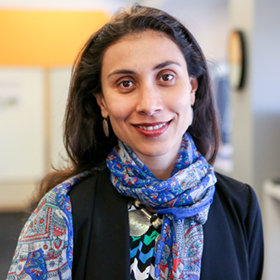The recent Ebola outbreak in West Africa and its speedy path to infections in Texas demonstrates how quickly local problems become global ones and how complicated addressing them can be. In a quest to tackle the world’s biggest challenges with speed and comprehension, there is growing consensus that we need an accelerated process by which different people with different skills, resources, and experiences can come together, surface ideas, and test the best ones.
Fortunately, over the past five years, the social innovation lab, a form of collaborative problem solving, has gained ground. There is also growing evidence that labs can scale and sustain their impact through a unique process that is grounded in a philosophy of experimentation and learning, drawing on diverse stakeholders across and within various sectors and fields.
As part of the Rockefeller Foundation’s strategy to build innovation capacity, it has funded and worked with six lab partners around the globe. It integrates those labs into initiatives that include improving livelihoods of small-scale fisheries in Indonesia and creating jobs for youth in the United States. To demystify lab practice and document how labs are contributing to social change, the Bridgespan Group and The Rockefeller Foundation have surveyed 75 labs and 23 funders, interviewed more than two dozen lab experts and practitioners, and convened leaders from 13 prominent labs to discuss and codify their best practices and results.
Our research identified four common results that labs deliver:
- They create knowledge from and for the system. Labs gather input from a variety of stakeholders to efficiently and holistically build and disseminate knowledge.
For example, over a 10-month period in 2013 and 2014, the Global Knowledge Initiative (GKI), supported by the Rockefeller Foundation, engaged 220-plus experts in areas such as agribusiness, finance, research, policy, and civil society to address challenges around post-harvest food waste and spoilage. These experts represented six different countries, and the sessions revealed unexpected insights—for example, the need to reframe incentives for and communication with smallholder farmers—that the foundation shared with its community of lab participants.
- They build capacity for implementation. Labs empower participants with new skills, processes, and momentum to implement solutions.
For example, the Sustainable Food Laboratory brings together global leaders representing the nonprofit, business, and government sectors—ranging from the Brazilian farmers organizations such as Assocene-Associação de Orientação das Cooperativas do Nordeste, Brazil, to Unilever—to pilot and implement projects related to sustainability in the global food systems, and apply lessons from those projects to their own organizations. By implementing a model developed at the lab, PepsiCo reduced the greenhouse gas emissions of all its European operations by 50 percent in five years.
- They build networks to sustain results. Labs foster networks and relationships to enable the testing, sustainability and scalability of solutions.
MaRS Solutions Lab, for example, supported by the Rockefeller Foundation, engaged more than 15 employers and stakeholders in a lab designed to develop insights about youth unemployment and identify prototypes to improve employment opportunities for “opportunity youth.” After participating in the lab, an US uniform supply corporation that participated in the lab decided to spearhead the develop one of the prototypes, [Youth]versity, a national campaign that encourages large corporations to include opportunity youth in their existing diversity policies and programs.
- They create solutions with a deeper understanding of root causes. Labs push forward solutions by developing an on-the-ground and in-depth understanding of the root causes and dynamics of problems. Their focus on prototyping allows for extensive iteration and testing in real-world situations early in the process.
inCompass, the HCD i-Lab at iDE, is a good example. The lab aimed to identify potential solutions, such as policy interventions or consumer-education campaigns, to eliminate the use of plastic bags in Cambodia. But human-centered design methods such as ethnographic research uncovered insights that forced the lab to think completely differently about who the "user" was and what the "solution" might be. It was market vendors, not customers, who used the most plastic bags, and it turned out that a policy intervention, which was the in-going hypothesis, would have created a black market. inCompass instead designed products—which it worked with vendors to test and iterated on—to meet their most important needs and create a more sustainable solution.
Although an estimated 70 percent of social innovation labs are less than five years old and the field’s total expenditure is only about $150 million per year, there are early signals that labs can offer a promising path to solving big challenges like disease outbreaks, food security, and youth unemployment. They enable rapid learning and prototyping fueled by multi-disciplinary wisdom.
Nidhi Sahni is a manager with The Bridgespan Group in New York.
Amira Bliss is a senior program associate at The Rockefeller Foundation in New York.
This blog is part of a November-December 2014 series on innovation labs, a joint project between Bridgespan and The Rockefeller Foundation. Please join us during the coming four weeks as we publish a broad range of insights from innovation lab practitioners, funders, and participants.
Upcoming authors include:
- Zaid Hassan, founder, Reos Partners
- Christian Bason, former director of MindLab and chief executive, Danish Design Center
- Philip Colligan, deputy chief executive of Nesta, the UK’s innovation foundation, and executive director, Nesta Innovation Lab
- Aleem Walji, senior advisor of the Learning, Leadership, and Innovation Vice Presidency within the World Bank Group
- Mariko Takeuchi, director, inCompass Human-Centered Innovation Lab (a division of iDE)
- Amanda Rose, senior program officer, Global Knowledge Initiative
- John B. Thomas, senior program associate, The Rockefeller Foundation
- Jeffrey T.D. Wallace, executive director, LeadersUp



